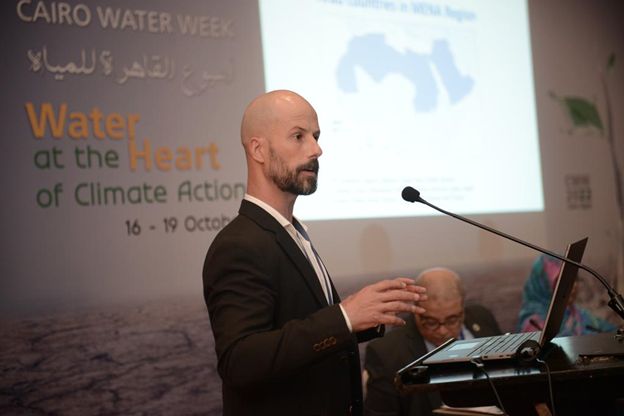High-level joint Water-Agriculture technical committee of League of Arab States discusses ReWater policy recommendations

Javier Mateo-Sagasta presenting ReWater Policy recommendations for more and safer water reuse
IWMI has strong track records on water reuse, including those from the ReWater MENA project. As a recognition to IWMI’s work, Javier Mateo-Sagasta, Senior researcher and project leader of ReWaterMENA, was invited to provide policy recommendations for more and safer water reuse in the Arab Region at the Fourth meeting of the High-Level joint Water-Agriculture Technical Committee of the League of Arab States (LOAS). The meeting took place on 8 Oct 2022 within the Cairo Water Week and was convened by LOAS, FAO and ESCWUA and counted with senior representatives from most Arab countries.
Javier Mateo-Sagasta summarized the key messages and recommendations from a forthcoming Sourcebook on water reuse in MENA that will be launched at the COP27. During his speech, Mateo-Sagasta stressed that the Arab region is facing a deep water crisis. “Wastewater is part of the problem, but also part of the solution”, he pointed out. And continued: “The amount of wastewater generated has doubled in the last 30 years but wastewater treatment capacity has not grown at the same rate in some countries, which led to increasing amounts of untreated wastewater being discharged to the environment. With more water pollution, there is less water safe to use, which aggravates the growing problem of water scarcity. But, wastewater can become part of the solution. Wastewater is the only source of water that is growing with population growth. Wastewater is 99% pure water and contains plant nutrients and carbon that can be recovered for beneficial purposes. If we control pathogens and other hazards we can recover and reuse these resources with benefits for all”.
Nevertheless, the reuse potential is still heavily untapped. According to ReWaterMENA research, the region loses in the sea or evaporated with no productive use around 54% of the generated municipal wastewater. Only 10-11% of municipal wastewater is treated and reused directly and 36% is reused indirectly many times informally and unsafely (because of the lack of treatment) like in parts of the Nile delta.
To make water reuse safer the region Mateo-sagasta recommends more and better health risk assessments in areas where indirect and informal reuse is happening. “The region needs also to mitigate risks by accelerating the expansion of cost-effective wastewater treatment, but not only. It is key to adopt on-farm practices for the safe use of recycled water and other solutions during food transport, processing, preparation or in markets, to avoid produce recontamination”.
To increase direct water reuse, Mateo-Sagasta stressed that the region needs bankable projects that optimize costs and clarify how cost are going to be recovered for financial sustainability. “It is also critical to improve perceptions and increase trust on reuse with monitoring and transparency, better communication and early stakeholder engagement. All under the framework of harmonic policies that overcome institutional fragmentation and promote adequate regulations”.
“I am happy and proud that these recommendations will be disseminated to the LOAS member countries”, Mateo-Sagasta concluded. IWMI is now in consultation with partners and stakeholders for the conceptualization of the project follow up, to continue supporting the region to expand safe water reuse.
To learn more about how to implement these recommendations read the thematic briefs ReWaterMENA has prepared
